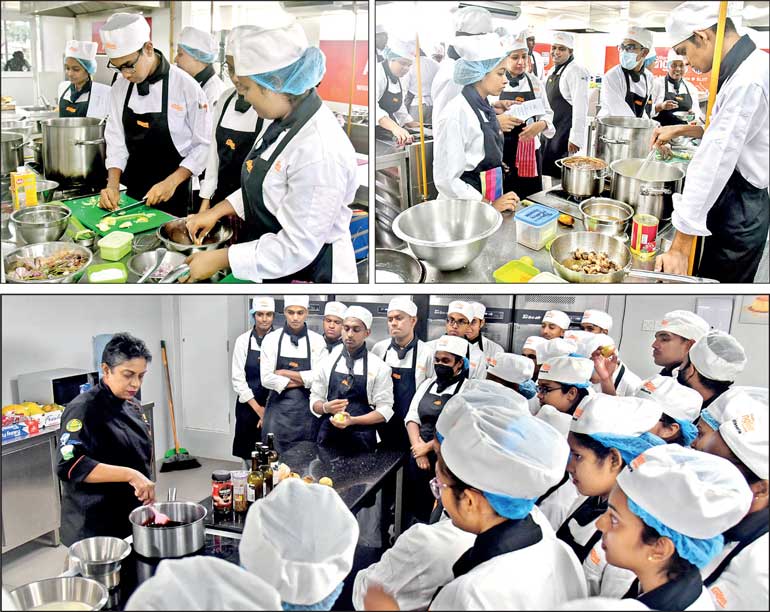Wednesday Feb 25, 2026
Wednesday Feb 25, 2026
Tuesday, 9 April 2024 00:56 - - {{hitsCtrl.values.hits}}

By Charumini de Silva
The William Angliss Institute, Australia, in partnership with the Colombo Academy of Hospitality Management (CAHM), marked a significant milestone as they celebrated a decade of accomplishments in tourism, hospitality and culinary education.
As the premier private hospitality management institute in Sri Lanka, CAHM, located at the Malabe campus of the Sri Lanka Institute of Information Technology (SLIIT), not only upholds rigorous standards for hospitality education but also embodies the enduring collaboration between Australia and Sri Lanka.

Passion is the key factor behind people choosing the industry and not the effort and monetary incentives that make them successful — William Angliss Institute Board Chair John Pandazopoulos
 Our partnership with the William Angliss Institute, Australia, has been instrumental in shaping our journey. A decade ago, when we founded the institute in Sri Lanka, in collaboration with the William Angliss Institute in Melbourne, Australia, we recognised the importance of acquiring the expertise and knowledge to deliver international-standard hospitality education locally. From humble beginnings with one curriculum stream, 10 faculty members and 60 students, we now serve 1,500 active students on campus, supported by an 85-member faculty with extensive industry experience — CAHM Chairman Errol Weerasinghe
Our partnership with the William Angliss Institute, Australia, has been instrumental in shaping our journey. A decade ago, when we founded the institute in Sri Lanka, in collaboration with the William Angliss Institute in Melbourne, Australia, we recognised the importance of acquiring the expertise and knowledge to deliver international-standard hospitality education locally. From humble beginnings with one curriculum stream, 10 faculty members and 60 students, we now serve 1,500 active students on campus, supported by an 85-member faculty with extensive industry experience — CAHM Chairman Errol Weerasinghe
 After initiating discussions with Errol Weerasinghe and his team, we identified potential collaboration in Sri Lanka. We initially planned to partner with a Government institution but later teamed up with the CAHM because we felt confident in their ability to contribute to the vibrant tourism industry through skill development — William Angliss Institute Australia International and Business Development Director
After initiating discussions with Errol Weerasinghe and his team, we identified potential collaboration in Sri Lanka. We initially planned to partner with a Government institution but later teamed up with the CAHM because we felt confident in their ability to contribute to the vibrant tourism industry through skill development — William Angliss Institute Australia International and Business Development Director
Wayne Crosbie
 Tourism is driven by human interaction. While possessing top-notch properties and data is important, it is ultimately the service culture and people behind them that make the difference. It requires a holistic approach, including various aspects such as curriculum development and practical training. At our institution, we offer a range of programs, including travel and tourism management and commercial cookery, to equip students with the skills needed by the industry. As we celebrate our 10th anniversary, our goal is to become the premier institution that produces graduates known for delivering exceptional service — William Angliss Institute at SLIIT Executive Director Nirvan Weerakoon
Tourism is driven by human interaction. While possessing top-notch properties and data is important, it is ultimately the service culture and people behind them that make the difference. It requires a holistic approach, including various aspects such as curriculum development and practical training. At our institution, we offer a range of programs, including travel and tourism management and commercial cookery, to equip students with the skills needed by the industry. As we celebrate our 10th anniversary, our goal is to become the premier institution that produces graduates known for delivering exceptional service — William Angliss Institute at SLIIT Executive Director Nirvan Weerakoon
 As industry demands evolved, SLIIT continued to adapt its programs to meet emerging needs. We understood the importance of providing a skilled workforce to support Sri Lanka’s service-oriented economy. There were two key objectives: one to provide higher education to a deserving and wider group of youth with greater opportunities and secondly to identify potential sectors and develop qualifications — SLIIT Vice Chancellor
As industry demands evolved, SLIIT continued to adapt its programs to meet emerging needs. We understood the importance of providing a skilled workforce to support Sri Lanka’s service-oriented economy. There were two key objectives: one to provide higher education to a deserving and wider group of youth with greater opportunities and secondly to identify potential sectors and develop qualifications — SLIIT Vice Chancellor
Prof. Lalith Gamage
 Passion is the key factor behind people choosing the industry and not the effort and monetary incentives that make them successful — William Angliss Institute Board Chair
Passion is the key factor behind people choosing the industry and not the effort and monetary incentives that make them successful — William Angliss Institute Board Chair
John Pandazopoulos
 “Our commitment extends beyond the classroom, as we strive to engage with industry partners and stay abreast of the latest developments. We also have rigorous marking schemes when it comes to examinations and hence, the best students are always hired by the top global brands in the industry” — William Angliss Institute Resident Representative Steven Bradie-Miles
“Our commitment extends beyond the classroom, as we strive to engage with industry partners and stay abreast of the latest developments. We also have rigorous marking schemes when it comes to examinations and hence, the best students are always hired by the top global brands in the industry” — William Angliss Institute Resident Representative Steven Bradie-Miles

Our partnership between CAHM and SLIIT is evident in this joint celebration. It exemplifies our shared commitment to nurturing talent and driving the tourism and hospitality industry’s growth in Sri Lanka— William Angliss Institute Australia CEO Nicolas Hunt
 “By maintaining close connections with industry stakeholders, the institution stays informed about the latest trends and requirements. This proactive approach aims to future-proof graduates by equipping them not only with current job skills but also with a foundation to adapt to future industry needs” — William Angliss Institute Australia Board Director Matteo Pignatellie
“By maintaining close connections with industry stakeholders, the institution stays informed about the latest trends and requirements. This proactive approach aims to future-proof graduates by equipping them not only with current job skills but also with a foundation to adapt to future industry needs” — William Angliss Institute Australia Board Director Matteo Pignatellie
With a shared vision to provide exceptional education in hospitality, tourism, culinary arts and events in Sri Lanka, the William Angliss Institute, Australia and CAHM were established. Over the past ten years, the partnership at the SLIIT campus has seen remarkable growth, expanding its facilities, curriculum offerings and international training opportunities to ensure that every student is equipped to excel and emerge as future leaders in Sri Lanka’s vibrant hospitality industry.
They recently organised a networking and awareness event for journalists aimed at familiarising them with the array of courses and programs available at the institute. In addition, the field tour sought to highlight the significance of higher education in the hospitality and hotel sector in Sri Lanka.
CAHM Chairman Errol Weerasinghe highlighted the dedication to excellence. “Our partnership with the William Angliss Institute, Australia, has been instrumental in shaping our journey. A decade ago, when we founded the institute in Sri Lanka, in collaboration with the William Angliss Institute in Melbourne, Australia, we recognised the importance of acquiring the expertise and knowledge to deliver international-standard hospitality education locally. From humble beginnings with one curriculum stream, ten faculty members and 60 students, we now serve 1,500 active students on campus, supported by an 85-member faculty with extensive industry experience.”
When discussing the financial aspects for students, Weerasinghe outlined the institution’s commitment to providing accessible education. “This approach aims to minimise costs while maintaining high-quality education standards, particularly considering the relatively high costs associated with hospitality education globally,” he pointed out.
CAHM Chairman expressed pride in the institution’s adherence to regulations and standards, asserting the comprehensive training students undergo.
Weerasinghe also highlighted the opportunities the comprehensive training provides, enabling graduates to excel in various roles within the industry globally with confidence and competence.
William Angliss Institute Australia International and Business Development Director Wayne Crosbie underscored that they had been actively involved in assisting Sri Lanka’s tourism industry and Government across various developmental stages.
He recalled their engagement in short-term programs post-tsunami, aimed at providing additional skills training for trade, particularly in the tourism and hospitality sectors.
“After initiating discussions with Errol Weerasinghe and his team, we identified potential collaboration in Sri Lanka. We initially planned to partner with a Government institution but later teamed up with the CAHM because we felt confident in their ability to contribute to the vibrant tourism industry through skill development,” Crosbie added.
SLIIT Vice Chancellor Prof. Lalith Gamage reflected on the institution’s 10-year journey, reminiscing the rapid expansion from one program to five, necessitating the development of a dedicated campus.
“As industry demands evolved, SLIIT continued to adapt its programs to meet emerging needs. We understood the importance of providing a skilled workforce to support Sri Lanka’s service-oriented economy. There were two key objectives: one to provide higher education to a deserving and wider group of youth with greater opportunities and secondly to identify potential sectors and develop qualifications,” he said.
The Vice-Chancellor also said SLIIT intends to introduce shorter courses and executive programs tailored to industry requirements, ensuring ongoing relevance and responsiveness to changing market dynamics.
He underscored the significance of their collaboration with CAHM and William Angliss Institute, emphasising the academic institution’s commitment to delivering high-quality education aligned with industry standards.
“Through this partnership, SLIIT aims to bridge the gap between academia and industry, offering students pathways to employment and further education, both locally and internationally,” Prof. Gamage stressed.
William Angliss Institute Australia CEO Nicolas Hunt elaborated on the alignment between the curriculum taught in Sri Lanka and that in Australia, ensuring students receive recognised qualifications and industry-relevant training.
He explained the importance of industry-focused teaching methodologies, complemented by state-of-the-art facilities, to prepare students for real-world challenges.
“Our partnership between CAHM and SLIIT is evident in this joint celebration. It exemplifies our shared commitment to nurturing talent and driving the tourism and hospitality industry’s growth in Sri Lanka,” he added.
Hunt highlighted the similarity between the student experience in Sri Lanka and Australia, noting the alignment of the curriculum taught through the William Angliss Institute programs. “Teaching styles are consistent, with over 10,000 hours of experienced teachers providing industry-relevant instruction. The focus is on active engagement and practical preparation, mirroring educational practices in Australia. Efforts have also been made to upgrade campus facilities to industry standards, providing students with familiar equipment and software tools. This ensures that they are well-prepared for their future careers. The educational approach also fosters industry initiatives and customer-centric thinking, aiming to meet the evolving demands of the sector,” Hunt explained.
He underscored the continuity of pathways for industry growth in Sri Lanka, citing the success of graduates in both countries. “Many students have completed accredited Australian qualifications and furthered their education at renowned institutions like the William Angliss Institute. We value our strong partnership with industry stakeholders and will continue to support graduates as they enter the workforce,” he added.
Acknowledging the progress made, Hunt also noted the need for ongoing engagement and improvement to better align educational outcomes with industry needs. “The 10-year celebration served as a testament to the enduring partnership between academia and industry, paving the way for continued collaboration and success,” Hunt said.
William Angliss Institute Board Chair John Pandazopoulos said, the institute regularly hosts industry leaders with extensive experience, who interact with students and offer insights into current industry trends. He pointed out that passion is the key factor behind people choosing the industry and not the effort and monetary incentives that make them successful.
William Angliss Institute at SLIIT Executive Director Nirvan Weerakoon highlighted the effort which goes behind the scenes for Sri Lanka to witness the surge in travel and tourism compared to other industries at present.
“Tourism is driven by human interaction. While possessing top-notch properties and data is important, it is ultimately the service culture and people behind them that make the difference. It requires a holistic approach, including various aspects such as curriculum development and practical training. At our institution, we offer a range of programs, including travel and tourism management and commercial cookery, to equip students with the skills needed by the industry. As we celebrate our 10th anniversary, our goal is to become the premier institution that produces graduates known for delivering exceptional service,” he said.
He shares that they want their students to feel a sense of community and empowerment, ready to tackle the challenges. “Through our collaboration with institutions like William Angliss, we provide students with hands-on experience and exposure to industry professionals. By the time they enter the workforce, they obtain not only academic knowledge but also practical skills and a mindset geared towards making a positive impact. Through initiatives such as workshops and industry news updates, we aim to not only educate but also inspire and transform the lives of our students,” Weerakoon explained.
William Angliss Institute Australia Board Director Matteo Pignatellie emphasised the industry relevance and timeliness of their programs, stating that they are regularly updated to meet the evolving needs of the industry.
He highlighted that these adjustments are driven by industry demands, ensuring that graduates possess the necessary skills, knowledge and energy to excel in their roles. “By maintaining close connections with industry stakeholders, the institution stays informed about the latest trends and requirements. This proactive approach aims to future-proof graduates by equipping them not only with current job skills but also with a foundation to adapt to future industry needs,” he added.
Crosbie suggested that the success of their graduates in securing employment and advancing in their careers is a testament to the effectiveness of their programs. He attributed this success to the institution’s commitment to industry relevance and continuous program refinement.
He also noted the institution’s international focus, leveraging resources and expertise from various parts of the world to ensure graduates receive comprehensive education and training that aligns with global industry standards.
William Angliss Institute Australia Asia Regional Business Development Manager Ray Patts said their initiatives involve providing students with hands-on experience, which enhances their skills and prepares them for the challenges they may face post-graduation. “This opportunity is strengthened by the Institute’s post-graduation exams, which assess students’ readiness for the industry. Moreover, students’ experiences within the industry during their studies play a crucial role. The Institute emphasises industry placements and exposure to real-world scenarios, allowing students to apply their knowledge in practical settings. For instance, students often engage in internships or projects abroad, such as in Kenya or the Maldives, which provide them with a solid foundation to pursue careers as international hospitality professionals,” he explained.
William Angliss Institute Resident Representative Steven Bradie-Miles outlined the significance of recognising their presence within the hospitality industry. He underscored the unique nature of hospitality education compared to traditional university programs. “Our commitment extends beyond the classroom, as we strive to engage with industry partners and stay abreast of the latest developments. We also have rigorous marking schemes when it comes to examinations and hence, the best students are always hired by the top global brands in the industry,” he added.
He said the continuous engagement with industry professionals ensures that the curriculum remains relevant and up-to-date, giving students a competitive edge in the job market.
Hunt outlined how the institute contributes to the community and fosters opportunities within Sri Lanka’s burgeoning tourism sector.
He explained the institute’s dedication to nurturing not only individual growth through education but also supporting the tourism industry as a whole. “Recognising the vital role of tourism in the country’s development, the institute, in collaboration with its partners under Errol Weerasinghe’s guidance, has initiated various short programs and community engagement activities to introduce local communities to the opportunities within the tourism industry,” he pointed out.
He highlighted the recent initiative launched of a community development and educational project, which was inspired by industry feedback emphasising the importance of local community involvement in tourism operations. “The project’s first cohort of students has completed an initial three-month induction period and will soon transition to internships, where they will gain practical experience in the industry. While the initiative is still in its early stages, the institute hopes it will prove successful in providing community-centred education and supporting both the industry and local communities,” he added.
CAHM Managing Director Anuk Weerasinghe, outlined the significant strides made by the Institute, attributing it to the strong partnership with the William Angliss Institute, Australia. “The impressive growth of the Institute today is a testament to the robust partnership we have cultivated with the William Angliss Institute, Australia, over the past decade. Their support, including generous grants, provision of state-of-the-art equipment, visits by Australian educators, and faculty resource sharing, has greatly benefited our students, enhancing the quality of their educational journey.”
In addition to its comprehensive curriculum and cutting-edge facilities, the joint venture between the William Angliss Institute and CAHM offers international training opportunities, including internships in Singapore and placements in France and the United Kingdom. As they embark on the next decade, the partners are committed to advancing excellence in hospitality education, fostering community development, and meeting the professional skills needs of Sri Lanka’s crucial tourism industry.
Pix by Ruwan Walpola